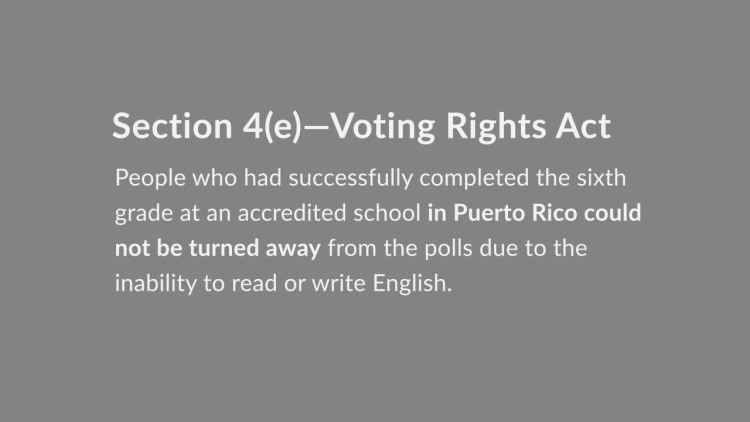Katzenbach v. Morgan
United States Supreme Court
384 U.S. 641, 86 S. Ct. 1717, 16 L. Ed. 2d 828 (1966)
- Written by Megan Petersen, JD
Facts
In 1965, Congress passed the Voting Rights Act. Section 4(e) of the act provided that no person who had successfully completed the sixth grade in a public or private school accredited by the Commonwealth of Puerto Rico, where the language of education was something other than English, could be denied the right to vote in an election because of his inability to read or write English. The election laws of the State of New York, however, required all voters to have the ability to read and write English as a requisite to voting. Morgan and other registered voters in New York City (plaintiffs) brought suit against Katzenbach (defendant), the United States government official tasked with enforcing § 4(e). The voters challenged the constitutionality of § 4(e) in federal district court on the grounds that it prohibited enforcement of New York’s election laws requiring an ability to read and write English as a condition of voting. A three-judge panel of the district court held that § 4(e) was unconstitutional, and Katzenbach appealed directly to the United States Supreme Court.
Rule of Law
Issue
Holding and Reasoning (Brennan, J.)
Dissent (Harlan, J.)
What to do next…
Here's why 907,000 law students have relied on our case briefs:
- Written by law professors and practitioners, not other law students. 47,100 briefs, keyed to 996 casebooks. Top-notch customer support.
- The right amount of information, includes the facts, issues, rule of law, holding and reasoning, and any concurrences and dissents.
- Access in your classes, works on your mobile and tablet. Massive library of related video lessons and high quality multiple-choice questions.
- Easy to use, uniform format for every case brief. Written in plain English, not in legalese. Our briefs summarize and simplify; they don’t just repeat the court’s language.





